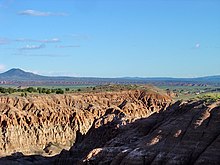Cathedral Gorge State Park
|
Cathedral Gorge State Park
|
||
|
Storm clouds over the eroded rock formations |
||
| location | Lincoln County in Nevada (USA) | |
| surface | 7.19 km² | |
| Geographical location | 37 ° 49 ′ N , 114 ° 25 ′ W | |
|
|
||
| Setup date | 1935 | |
| administration | Nevada Division of State Parks | |
The Cathedral Gorge State Park is a state park north of Panaca in Lincoln County in Nevada on US Highway 93 . Founded in 1935, it is one of the first four state parks in Nevada. The park lies at an altitude of 1500 m and, with its rock formations, covers an area of 7.19 km². The dry climate varies in summer from 40 ° C during the day and 13 ° C at night. In winter there can be frosts.
history
geology
In the Pliocene , the Meadow Valley and thus also the area of today's gorge was covered by a lake. The colorful Panaca Formation consists of the deposits and sediments of the former lake. Over time, the lake seeped away, and erosion from rain, wind, and meltwater led to rivulets, indentations, washouts and finally the canyon-like canyon in the soft siltstone and clay minerals. This left cathedral-like sandstone formations, narrow gorges and chimneys, rock needles and cave-like narrow passages.
Human use
Nomadic cultures of ancient America already used the valley about 10,000 years ago. The Freemont, Anasazi and Paiute hunted here depending on the season.
Panaca was settled by Mormons in 1864 . The discovery of silver ore led to the creation of Bullonville in 1869 . Some remains of the old city can still be seen to the east of the main entrance to the park. Bullonville Cemetery is just north of the entrance.
During the 1920s the park became a popular destination for picnic trips and short hikes as part of the increasing mobility.
In 1924, Governor James Graves Scrugham visited the site and began purchasing the land. In 1935, Cathedral Gorge State Park became an official reserve. The Civilian Conservation Corps established the first fixed facilities for picnicking and camping, e.g. B. the Stone Water Tower.
Nowadays the park is open around the clock all year round, but its use is subject to some restrictions, in particular anything that could accelerate erosion, such as B. Off Road Driving.
Flora and vegetation
The different soil types in the park enable a variety of plant communities to find a suitable location. The loamy ground below the slopes allows only a few plants to take root because of the continual erosion. Small sand dunes, however, were conquered by numerous wildflowers and grasses such as B. the Dune Primrose or the Indian Rice Grass.
Direction center of the valley have the soil to a fertile soil mixed on the Yucca , juniper , sagebrush , sarcobatus shrubs, White Sage , and Atriplex confertifolia occur. Different types of cacti can also endure the climatic fluctuations in the valley.
Trees were planted in the edge areas to provide shade.
fauna
Small mammals make up most of the wildlife in the park. Donkey hares , cottontail rabbits , coyotes , kit foxes , skunks , squirrels , kangaroo rats and mice can be seen here on four paws, and in winter a deer can be seen at Miller Point.
Most of the bird life is found near picnic areas and bushes. Bunting like the Amphispiza bilineata , American thrush , finch and starling , great falcon and hawk , corvids and the great roadrunner meet here with the American woodpecker species "sapsucker" and migratory birds such as the cottage warbler , the wood warbler , the cedar waxwing and even hummingbirds.
Numerous non-poisonous reptiles, snakes and lizards populate the sheltered sunny spots and in the summer the Great Basin Rattlesnake can also be found.
Web links
- Cathedral Gorge State Park at Nevada Division of State Parks
- The park near Desert USA
- Pictures and travel report (German)
- Cathedral Gorge State Park on the United States Geological Survey's Geographic Names Information System








